'Een Beytie Hollansche'
(1994)–James Boswell–Dutch Compositions
[pagina vii]
| |
IntroductionBoswell in the NetherlandsSeen off by Dr Johnson, James Boswell, not yet 23,Ga naar eind1. on 6 August 1763 embarked at Harwich on ‘the Prince of Wales packet-boat’ for the Netherlands, where he landed, at Hellevoetsluis, the following day ‘at twelve at noon’.Ga naar eind2. After living for nine exciting months in London, where in a rakish existence he had partly managed to ‘transform himself from a raw and romping boy into a high-bred man of pleasure’,Ga naar eind3. and had become the friend of Samuel Johnson, more than thirty years his senior, in August 1763 Boswell was on his way to Utrecht to continue his law studies, already begun in Scotland. As Pottle says: The selection of Utrecht as the place for Boswell's legal education had nothing odd or unusual about it. Scots law, a totally different system from the English, makes a great deal of Roman law; and as the Dutch were the great masters of Roman law, it was usual for young men preparing for the Scots bar to complete their education in Holland. Boswell's father and grandfather (also a lawyer) had studied at Leyden; Utrecht had been selected for Boswell on the advice of Sir David Dalrymple, a common friend to Boswell and his father and a mediator of their differences. Though the main objective was the law, it was hoped that he might also improve himself generally in culture and in manners; and for this purpose Utrecht was thought to offer advantages over Leyden. (2-3) However, it is clear that Boswell himself was not very happy about this decision. For a start he was extremely reluctant to leave London. And the final entry in his London Journal exhibits his general melancholy or depression, from which he habitually suffered, as well as the more specific causes of his gloomy departure: THURSDAY 4 AUGUST. This is now my last day in London before I set out upon my travels, and makes a very important period in my journal. Let me recollect my life since this journal began. Has it not passed like a dream? Yes, but I have been attaining a knowledge of the world. I came to town to go into | |
[pagina viii]
| |
the Guards. How different is my scheme now! I am now upon a less pleasurable but a more rational and lasting plan. Let me pursue it with steadiness and I may be a man of dignity. My mind is strangely agitated. I am happy to think of going upon my travels and seeing the diversity of foreign parts; and yet my feeble mind shrinks somewhat at the idea of leaving Britain in so very short a time from the moment in which I now make this remark. How strange I must feel myself in foreign parts. My mind too is gloomy and dejected at the thought of leaving London, where I am so comfortably situated and where I have enjoyed most happiness. However, I shall be happier for being abroad, as long as I live. Let me be manly. Let me commit myself to the care of my merciful Creator.Ga naar eind4. With such brave resolution, then, Boswell set off. However, once in Holland, he did not dispatch himself to Utrecht, but preferred to linger a few days in Rotterdam with Archibald Stewart, a young man of Boswell's own age or younger with whom he had not previously been so well acquainted, and who turned out to be a great support to Boswell when he needed it. From Rotterdam he went onto Leiden, where he passed another couple of days. Then, as Boswell writes to his friend John Johnson (in a letter from Utrecht, dated 23 September 1763): I began to turn low-spirited, and set out for Utrecht. I travelled between Leyden and Utrecht nine hours in a sluggish trekschuitGa naar eind5. without any companion, so I brooded over my own dismal imagination. I arrived at Utrecht on a Saturday evening. I went to the Nouveau Château d'Anvers. I was shown up to a high bedroom with old furniture, where I had to sit and be fed by myself. At every hour the bells of the great tower played a dreary psalm tune. A deep melancholy seized upon me. I groaned with the idea of living all winter in so shocking a place. I thought myself old and wretched and forlorn. I was worse and worse next day. All the horrid ideas that you can imagine, recurred upon me....I thought at length the time was come that I should grow mad. I actually believed myself so. I went out to the streets, and even in public could not refrain from groaning and weeping bitterly....Tortured in this manner, I determined to leave Utrecht, and next day returned to Rotterdam in a condition that I shudder to recollect. (5-6) | |
[pagina ix]
| |
Boswell told another friend, William Johnson Temple, in a letter from Rotterdam on 16 August 1763, that as a consequence of his initial response to Utrecht, he had taken refuge with Archibald Stewart, whom he describes as ‘a very fine fellow’: Though volatile, he has good sense and generosity. I told him my miserable situation and begged his assistance as the most unfortunate of mortals. He was very kind, took me to his house, talked with me, endeavoured to amuse me, and contrived schemes for me to follow. (7-8) For the next month, although he twice returned to Utrecht, he was very restless, spending more time in Leiden and Rotterdam as well as visiting Amsterdam. As he wrote to Temple from Rotterdam on 2 September: I waver about the place of my residence. At Leyden I shall be within three hours of The Hague. I shall have the youngest Prince of Strelitz, and Mr. Gordon, Lord Aberdeen's brother, for my companions. At Utrecht I hear of no agreeable companion. Count Nassau is a man in years, though very polite. Utrecht has assemblies.Ga naar eind6. But I am told they are most exceedingly dull. Add to this the shocking disgust which I have taken to Utrecht. I would therefore incline for Leyden. But, then, I came over with an intention to stay at Utrecht; and Sir David Dalrymple would not be pleased if I should forsake his favourite place. (16) So despite the attractions of noble companions in Leiden, and courtly company in The Hague, in the end Boswell was manly enough to grit his teeth, resolve to do his duty, and fulfil the promises and obligations that he had made earlier, and return to Utrecht on 15 September where he stayed for the next three months. Like any good student, or any previously irresolute student who resolves to mend his ways, he was determined to set himself a regular regimen of studies: SATURDAY 24 SEPTEMBER. This day regular plan. Ovid till breakfast, Tacitus till eleven, dress till twelve, then either Trotz or visits; dine Plaats Royaal....Three to four, French; four to five, Greek; then coffee; then notes of law, and history, and journal, and Erskine's Institutes....Get Corpus Juris. Billiards is the only mala fama here. Make resolve against it. Write Stewart at night. Miss S.Ga naar eind7. is again evaporated. You see how vain a fancy. You must not marry for some years, unless Temple bids. Write | |
[pagina x]
| |
him on Tuesday, long composed letter, sensible and on a subject of learning mostly. Persist firm and noble. (31) Rather than wait until Tuesday, in fact Boswell wrote a ‘long composed letter’ to Temple the next day, full of earnest questions and reflections on how he ought to live, including a serious consideration of the moral and economic advantages of marrying Miss Stewart. He also reminded himself and Temple: I am now at a foreign university, or rather in a foreign city where I have an opportunity of acquiring knowledge. I am at a distance from all my dissipated companions. I may attain habits of thought, study, and propriety of conduct. I am next to travel through Europe. I shall always be on my guard to persist in the proper course, and hope to return to England so confirmed in it that I shall be able to proceed through life with unaffected rectitude. (34) To this end he continued to record admonitory memoranda for himself: WEDNESDAY 5 OCTOBER....From this time let plan proceed: seven to eight, Ovid; eight to nine, French version; ten to eleven, Tacitus; three to four, French; four to five, Greek; six to seven, Civil Law; seven to eight, Scots; eight to ten, Voltaire. Then journal, letters, and other books....(38-39) Apart from the Classics and his Law studies, Boswell began to practise his French writing not long after he had begun to settle down in Utrecht. As he says in his very first French Composition (dated c. 16 September): In acquiring any language, it helps to write a great deal, because by doing so one learns spelling, without which the knowledge of a language is very imperfect. But, besides, when one writes, one must understand the grammar perfectly or make many absurd mistakes which, although they may pass unnoticed in the rapid flow of conversation, will certainly be discovered at once by the reader. For this reason I have resolved to write a little every day...(22).Ga naar eind8. In all, during his stay of just over ten months in the Netherlands (about 308 days in all), Boswell wrote 232 quarto pages of French, which | |
[pagina xi]
| |
allowing for occasionally lapses during high days and holidays, indicates that most days he must have written at least one page of French, and sometimes two. As he himself said in one of his French Compositions on 31 October: It is certain that I have the greatest desire to learn French, but I fear that I am not learning it quickly. Perhaps my keen desire makes me think myself worse in acquiring the language than I am. I certainly take a great deal of pains to improve. I write two pages of a theme every morning. I read for two hours in the works of Voltaire every evening. When I do not understand words perfectly, I look them up in the dictionary, and I write them down with their meanings. He had particular incentives to improve his French, both cultural and social: Every Wednesday I have the pleasure of passing the evening in a literary society where it is not permitted to speak a word of anything but French; and I dine at Mr. Brown's, where there are two ladies who do not speak English, and where for that reason it is always necessary to speak French. (55)Ga naar eind9. The two ladies referred to are the Swiss wife of the Reverend Robert Brown, a Scotsman who was minister of the English Presbyterian Church in Utrecht with whom Boswell dined regularly in order to improve his French, and her sister. After meeting a friend of theirs, Isabella Agneta Elisabeth van Tuyll van Serooskerken, for the first time towards the end of October, Boswell had an even greater motivation for improving both his French conversation skills and his writing. He first refers to Belle de Zuylen, in a memorandum of Monday 31 October, when he rebukes himself: Yesterday you did not at all keep to rules as you ought to do. You had sat late up and rose irregular. You went to Guiffardière at eleven and talked too foolishly and too freely. At night you were absurdly bashful before Miss de Zuylen....You put on foolish airs of a passion for Miss de Zuylen. (55) The same day he had written a set of half-a-dozen rhyming couplets expressing his growing sentiments about his new acquaintance: | |
[pagina xii]
| |
And yet just now a Utrecht lady's charms
Make my gay bosom beat with love's alarms.
Who could have thought to see young Cupid fly
Through Belgia's thick and suffocating sky?
But she from whom my heart has caught the flame
Has nothing Dutch about her but the name.
Let not an ear too delicate recoil
And start fastidious when I say ‘De Zoile’;
So mere a trifle I can change with ease:
Your tender niceness will ‘Zelida’ please? (54)Ga naar eind10.
Clearly by this time Boswell had indeed settled into Utrecht, and had developed a network of friends and acquaintances who sustained his social, cultural, and intellectual needs as well as his romantic and amorous fantasies. Christmas and the New Year Boswell enjoyed in The Hague and Rotterdam, with a couple of days in Leiden, where he spent some time with the famous classical scholar and University Librarian, Abraham Gronovius, to whom he had first introduced himself with a letter from his father when he had first visited Leiden in August (24-25). Five months later, clearly more relaxed, Boswell recording his recent visit to Leiden, and his taking leave ‘by a short shake of the hand of Abraham Gronovius’, after which he ‘surveyed Leyden as Father's old town’, boasts (using his customary second person pronoun to address himself), ‘You have really an affection for Holland’. The next day he records: TUESDAY 10 JANUARY. Yesterday you left Leyden early in the morning, dark and solemn, and kept up spirits well in schuit, though rainy. Arrived at Rotterdam at half after one; hearty reception by Stewart. Glad to see the house again where you endured so much....(114) The prospect of this visit to Stewart in Rotterdam from The Hague had inspired what appears to have been Boswell's first attempt, at least his first public attempt, to write Dutch, in a letter addressed to ‘Myn Heer/De Heer Archibald Stewart/op te Schipmaaker's Haaven/Rotterdam/Met een Degen’:Ga naar eind11. | |
[pagina xiii]
| |
Myn Heer en Vrind, My dear Sir and Friend, | |
[pagina xiv]
| |
Soon after Boswell's return to Utrecht in the middle of January 1764, he obviously began to resolve to write more Dutch. In preparation for this trial of his affection for Holland he had developed other native habits: With the same ease that blackguards feed on tripe
Have I, James Boswell, learnt to smoke a pipe:
For I am now a very Dutchman grown,
As all at Utrecht cannot fail to own....(122)
This was written on 21 January, and at the start of the next month he announced his resolution: Terwyl ik bin van voomemens om de hollansche taal te leeren, dat is te zeggen: Terwyl ik hebben lust te minsten een beytie te leeren zoo dat ik can met de Hollanders conversatie hebben, zoo heb ik geresolveer'd alle daag een beytie in dat taal te schryven. Als van daag is Het eerst van Februari, ik begin met de grooter plaisir tot te het begin van een maande en ook Het begin van Het voojaar. Since I intend to learn Dutch, that is, since I want to learn at least a little, so that I can talk with Dutch people, I have resolved to write a little in that language every day. As today is the 1st February, I am beginning with the greater pleasure, since it is the beginning of the month and also the beginning of spring.Ga naar eind15. Apparently Boswell had made an arrangement with Mr Brown for him to correct his Dutch compositions, although he seems to have been somewhat apprehensive of causing the clergyman too much trouble. From this first declaration and demonstration of intent on 1 February (at what for some odd reason he identified as the beginning of spring) until about 6 March, Boswell wrote twenty quarto pages of Dutch. Thereafter, until he left for Germany and the beginning of his Grand Tour on 19 June 1764, he seems to have written no more. It is possible that, like Boswell's Dutch Journal itself,Ga naar eind16. the notebook in which he continued to write his Dutch Compositions is lost. It is most probable, though regrettable, that Boswell had lost interest in the exercise. He went on writing his French Compositions and wrote a number of letters in French, particularly to Madame de Spaen, to whom he confessed his ‘French [was] still very imperfect’ (194), presumably because of its | |
[pagina xv]
| |
greater usefulness in the social world in which he moved and his anticipation of further travels on the Continent. About the time that he appears to have stopped writing his Dutch Compositions, he received news of the death of his ten-month-old natural son, Charles, who had been born to a servant shortly after Boswell's departure from Edinburgh in November 1762. As one of his Dutch Compositions tells us (no. 17) he was also troubled at this time with a bad cold. He was clearly once more very unsettled and looking forward to leaving Utrecht, and the Netherlands as a whole for new adventures. As he admitted in a letter to Temple on 23 March: During our Christmas vacation I went to The Hague, where I passed some weeks in brilliant dissipation. I received great civilities from my Dutch relations and other people of the first distinction. Upon my return to Utrecht I found that my mind had been weakened. I had not the same vigour as before. I took a severe cold, which hurt my spirits, and some posts ago I received accounts of the death of that child of whom you have heard me talk so much.... However, he admits that already that very day he feels ‘so much better as to see that I must not yield to slight disgust’ and that he ‘must follow out the plan upon which [he] came hither, nor think of stirring till the Civil Law Lectures are ended’. He lists some of the Classical texts he has read, and, weighing up his achievement, claims: I have advanced very well in French. I am just about finishing Voltaire's General History. I have picked up a little Dutch. I have not given such application to the Civil and Scots law as I ought to have done; however, I have done tolerably. (189-90) Evidently Boswell, involved in an ambiguous complicated relationship with Belle de Zuylen, felt that he was on his way out, and was mentally preparing himself to leave. In these circumstances, he dropped his zeal | |
[pagina xvi]
| |
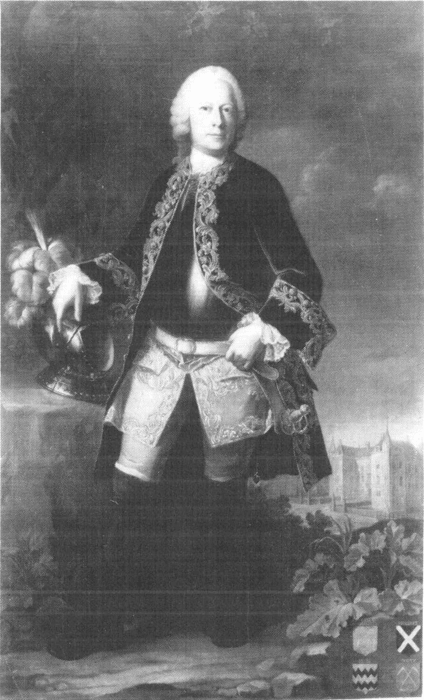
Diederik Jacob van Tuyll van Serooskerken (oil painting by G.J.J. de Spinny, 1756)
| |
[pagina xvii]
| |
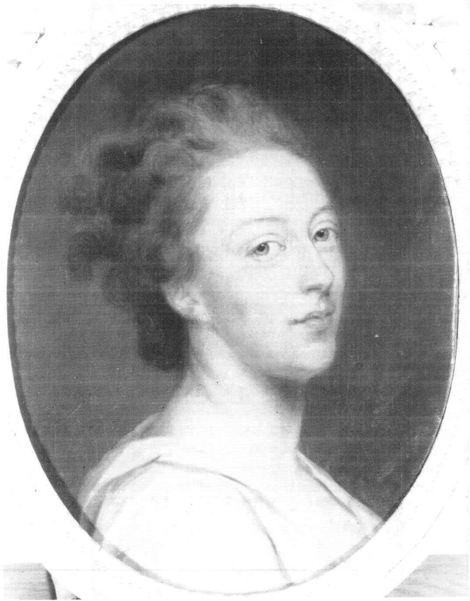
Belle de Zuylen (oil painting by J.J. Maurer)
| |
[pagina xviii]
| |
to further his Dutch studies. In his last two months in Holland he travelled to Leiden and then to The Hague, for further dissipations over the Easter vacation, and visited Scheveningen a couple of times. He tried out the practical value of his Dutch in an Amsterdam bawdy-house, for some reason finding that ‘It was truly ludicrous to talk in Dutch to a whore’. But although he ‘danced with a fine lady in laced riding-clothes, a true blackguard minuet’, smoked his pipe, and ‘performed like any common sailor’, nearly quarrelling ‘with one of the musicians’, and ‘spoke plenty of Dutch’, he ‘could find no girl that elicited [his] inclinations’: ‘I was disgusted with this low confusion, came home and slept sound’ (254-55). Whatever he may have learned of value about himself and others during his time in the Netherlands, and however well he had managed to persuade himself that he had overcome his initial depression and had exerted sufficient discipline over himself to use his time productively, it is evident that Boswell was once more very uneasy. It is possible that his time in the Netherlands, especially the two periods of four months that he was fixed in Utrecht, were a necessary shock therapy that projected the irresponsible young man into maturity. As he was to admit to Temple in a letter written from Berlin later that summer: What a gloomy winter did I pass at Utrecht! Did I not speculate till I was firmly persuaded that all terrestrial occupations and amusements could not compose felicity? Did I not imagine myself doomed to unceasing melancholy?...And yet, my friend, I am now as sound and as happy as a mortal can be. How comes this? Merely because I have had more exercise and variety of conversation....One great lesson to be learned is that man is a practical being. It is hard, but experience proves it to be true that speculation renders us miserable. Life will not bear to be calmly considered.Ga naar eind17. However, earlier in his final letter to Temple from Utrecht on 17 June 1764, a day before he left for Nijmegen, and after that for Germany, Boswell signed off his Dutch adventure with a brief but authoritative and confident set of judgements about what, after ten months (and the consultation of a number of standard sources), he made of the Netherlands and the Dutch: You have asked me for a letter on the present state of the Dutch, which I can only make out by giving you some detached observations.... | |
[pagina xix]
| |
| |
[pagina xx]
| |
Hague and among the rich merchants at Amsterdam. After this, Boswell was on his way to try to meet Frederick the Great (which he failed to do, despite all his efforts when he was in Berlin and Potsdam in July and September 1764),Ga naar eind19. and more successfully to interview Voltaire and Rousseau.Ga naar eind20. Boswell and Belle de Zuylen continued to correspond with each other for another four years. | |
Boswell and DutchBoswell was a man with philological and lexicological interests. For instance, his admiration and respect for Samuel Johnson was inspired by Johnson as the compiler and author of the Dictionary of the English Language (1755). Boswell was also interested in foreign languages, and had a talent for acquiring them. In the Netherlands he did his best to master French, which he used daily, and needed to speak and write fluently, since on the Continent French was the lingua franca of the upper classes. Amongst the Dutch aristocracy, without knowledge of French one had no standing; characteristically Boswell sought to enlarge his acquaintance with French by initiating a number of romantic relationships. His command of the language, both written and spoken, must have progressed rapidly in a relatively short space of time. Society appears to have been fond of the young Scot, as he was regularly invited to private balls. A letter of introduction from Sir David Dalrymple had opened up the Utrecht circle around the Count of Nassau La Lecq to Boswell; and it was this gentleman who introduced Boswell at the private ball, which opened the winter season of 1763, held at the residence of his sister-in-law, the Countess Johanna of Nassau-Beverweerd.Ga naar eind21. For somebody who was above all doing his best to acquire French and who was mainly in the company of the social élite, it was not necessary to learn Dutch. In any event this was not an easy task, since there were no good grammar books, and the available dictionaries were | |
[pagina xxi]
| |
not suited to everyday conversation. Nor can it have been easy at that time to find a native speaker who was both able and willing to give someone from Britain Dutch lessons. Yet Boswell acquired an elementary command of Dutch, which undoubtedly helped him to master the basics of German, as well.Ga naar eind22. As he says in his first Dutch Composition, Boswell wished to learn Dutch primarily to be able to mix and talk with ordinary Dutch people, and not just with the upper classes. Perhaps this aspiration was influenced by the example set by his father, who, during his time as a student in Leiden, had quickly learned to make himself understood in Dutch. Yet Boswell also had to conquer a certain amount of prejudice, since several influential people would have discouraged him from learning Dutch. For example, the Professor of Mathematics in Utrecht, a Florentine nobleman, announced contemptuously, and publicly, that Dutch was a language for horses. This learned man had been employed at the University of Utrecht since 1751, and made this announcement on board the schuit to Amsterdam, probably in French. Boswell describes how, had it not been for the presence of ‘a gentleman who knew him by sight’, a strong Dutchman might have thrown the professor overboard, which indicates that such disrespect could even provoke those who knew French.Ga naar eind23. This derisive attitude to the native language appears to have been mostly a matter of class and position. Boswell explicitly disassociates himselffrom such a foolish prejudice, since he is proud of his own Dutch blood, and he calls Dutch an old, rich language that is certainly not inferior to French. Therefore, when speaking Dutch, he is determined to avoid French words, declaring that Dutch people no more require French words than they require French money, since both linguistically and economically they have enough wealth of their own. He also thinks it a profound shame that so much French is used in The Hague, a situation which he considers a sign of decadence. An explanation for this practice is offered him by a sensible upper-class Dutchman: The Hague is the place where foreign diplomats reside and also many French emigrants, who serve the diplomats as wigmakers, dancing masters, fencinginstructors and actors. In addition, there is an historical explanation, since Dutch law dates back to the Burgundian era, when French prevailed in the principal institutions of government. Jurists, therefore, use a terminology based on French. Boswell's unknown acquaintance was well informed, since this last point relating to the use of French in | |
[pagina xxii]
| |
the law was an old and familiar complaint. As early as 1553 the Antwerp jurist Jan van den Werve, in his Tresoor der Duytscher Talen, had given his colleagues an explanation of the bastardizations then in use.Ga naar eind24. That this tract was needed can be seen from the fourteen editions it went through. In the seventeenth century, too, there were continual complaints about the use of language in The Hague;Ga naar eind25. and a century later, because of the status that French had acquired everywhere on the Continent in upper-class society, this situation had changed little. During his stay in Utrecht the tea-parties and balls of the aristocracy, as well as the law lectures of Professor Trotz, determined Boswell's social course. As far as the lectures are concerned, Boswell does not seem to have followed any other than Trotz's. Indeed he never even registered at the University of Utrecht, for in the Album Studiosorum he is not mentioned. In fact, apart from his association with Belle de Zuylen, he did not experience many intellectual pleasures during his stay in Utrecht. Yet there was one exception: the Thursday evening meetings of a philosophical society, which he mentions in Composition 8. The Reverend Mr Brown, who apparently played an important role in this society, intended to read aloud parts from Lambert ten Kate's Aenleiding as a prelude to a discussion of ancient history and etymology. After that, on the basis of changes in their pronunciations, the origins of the separate nations were to be discussed. Nothing else is known about the Utrecht philosophical society or its members, who were undoubtedly a small group of learned enthusiasts. Composition 8 shows that it consisted of people from France and Britain, as well as from the Netherlands, and, apart from Reverend Brown and Boswell, included Baron Diederik van Tuyll van Serooskerken (Belle de Zuylen's father) and Professor Gysbert Bonnet. Indeed, it was the theologian Bonnet who first mentioned Ten Kate's work, on an occasion when Boswell was taking tea with the Van Tuylls (where, incidentally, Boswell did his best to speak a little Dutch), as it clearly showed the relationship between Dutch, Old Saxon, Icelandic and Latin. Boswell was immediately interested in the book and the professor promised to lend it to him the next day. The Aenleiding tot de Kennisse van het Verhevene Deel der Nederduitsche Sprake (Introduction to the Knowledge of the Origins of the Dutch language)Ga naar eind26. had apparently penetrated to the academic world forty years after its first appearance, despite the fact that it was not written in Latin.Ga naar eind27. Although the great value of this book was immediately recognized, it barely played a role in professional literature abroad, precisely because it had been | |
[pagina xxiii]
| |
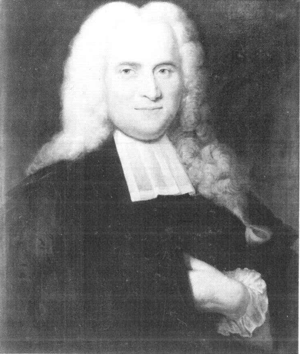
Christiaan Hendrik Trotz (oil painting by J.M. Quinkhard, c. 1760)
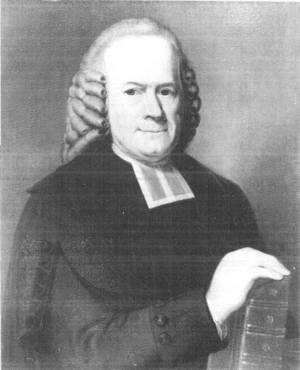
Gijsbertus Bonnet (oil painting by J.J. Maurer, 1780)
| |
[pagina xxiv]
| |
written in Dutch. The brilliant linguist Lambert ten Kate (1674-1731), the founder of comparative historical Germanic linguistics,Ga naar eind28. was an unmarried Amsterdam cereal merchant, who appears to have given private lessons in several different subjects. During his youth he had studied Newton's philosophy, and he was an amateur artist, painter, and singer. It is not clear whether he himself was entirely responsible for his development into a great linguist, but he certainly was original. He believed that the rules of language had to be found empirically within the language itself; and by language, he meant both the written and the spoken forms - another notion that was new. In his Aenleiding he presented his own phonetic script, and the work also includes the first Gothic grammar, the first historical grammar of the Dutch language, and an etymological dictionary. He was also interested in the affinity between the Germanic languages. especially in respect to the vowel changes they share in strong verbs (break, broke, broken) and to the stress which in Germanic tongues always falls on the first syllable of the stem. So it is no wonder that Ten Kate's book became an object of study in the Utrecht philosophical society. Boswell borrowed the book from Bonnet and subsequently showed it to the Reverend Brown, who was so delighted with it that he immediately wished to translate some parts of it into French to read aloud in the philosophical society. Since no one has yet studied the reception of Ten Kate's work, the scanty details that Boswell gives about the response of people in his small circle to it are of great importance and deserve to be widely known. How are we to judge Boswell's command of Dutch? Composition 11 he claims to have written without the aid of a dictionary, but there his Dutch is neither better nor worse than in his other exercises. Therefore, it is still a matter of debate whether he possessed William Sewel's Dictionary (the fourth enlarged edition from 1749), and actually used it. In any case the Compositions, as we have them, appear in a rough, uncorrected form. If Mr Brown had really corrected them, as Boswell had originally planned, he would have found the job quite a taxing one. Boswell seems to have anticipated this when, in Composition 1, he expresses the hope that the poor corrector will not lose patience with his work. In Composition 12 Boswell calls Mr Brown his ‘Dutch master’, and devotes a separate essay to him, in which he jokes that only the prospect of paying ‘a fine offifty guilders to the board of the English Church’, compels him to make this effort. Boswell's Dutch is full of anglicisms as far as spelling is concerned | |
[pagina xxv]
| |
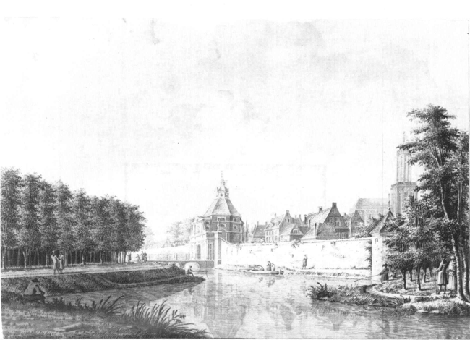 Previous page: View of Utrecht (by T. Verrijk, c. 1780)
| |
[pagina xxvi]
| |
(geresolveer'd, Koopleeder's, gezeen, bevreez'd, franshe, etc.),Ga naar eind29. word formation (meer gelukkig als eening Scotsman),Ga naar eind30. word choice (een heel voltooide vrow, Neen, neen, dat can niet worden)Ga naar eind31. and word order (voor it sall speyt me seer, Ik dogt dat ik zoud niet minder doen als een Bezoek te Mynheer de Professeur te geeven).Ga naar eind32. But even without those anglicisms there remain enough puzzles. For example, what should we make of kribbig Achtbaarheyd and fatzoenlyk gemaklykeyd?Ga naar eind33. Or of all those different ways of spelling The Hague (S'Haag's, t' s'aags, t gage)?Ga naar eind34. With the grammar, too, there are, as one would expect, many mistakes. For instance, Boswell had a great deal of difficulty with personal pronouns and with verb forms (Ik weet weel dat voor 't meerderdeel men zyn [= hen] ‘Professeurs’ noemen).Ga naar eind35. Nevertheless these short essays (indeed little more than compositions) make fascinating reading because of their true Boswellian ring, that even in the poor Dutch is still clearly audible. His delicate touch, his self-ridicule, his humorous inward dialogues, his indignation at the injustice done to Dutch - Boswell's light-footedness and choice of themes could have taught several useful lessons to many Dutch authors of the period. 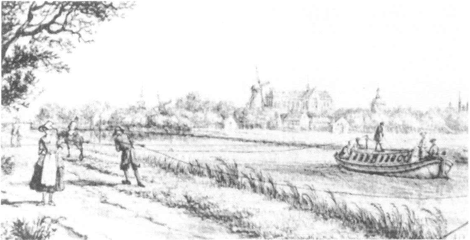 ‘Trekschuit’, on the way to Leiden (by P.C. la Fargue, 1765)
|
|

